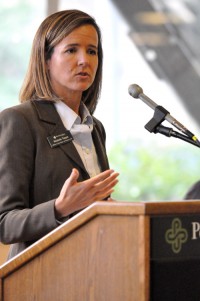Conflict resolution is rarely an easy task. Prior to June 2011, if students had an academic issue, a difficulty with a colleague or supervisor or a more serious problem, they would have been able to walk into the Ombuds Office for help.
Since the office’s closure, access to resources has been rerouted. Student-related issues are now handled by the Office of the Dean of Student Life. Issues involving faculty and employees have been channeled to Human Resources and Academic Affairs.

A campus as large and diverse as Portland State can make locating resources confusing and challenging. There are so many options it can be hard to find a starting point. What was gained and what was lost by the closing of the Ombuds Office?
Carol Gabrielli, former PSU Ombuds and current senior human relations specialist for the university, explained that previously, “when a person found themselves in a conundrum, they could come to the Ombuds Office—to a place that made it their business to understand how the campus worked.”
Gabrielli said the Ombuds was not an advocate but rather an information hub for campus resources. Once a person left the office with relevant information, there was no further contact. Now, with support in place to follow up on personnel issues, there seems to be a clearer path to resolution. According to Gabrielli, if a complaint is brought to human resources, the staff will work to address and resolve the issue step by step.
Since many of the discussions with the ombuds were anonymous, the office would present the administration with a generic list of concerns and trends. Now, the administration is provided with more specific guidance about where problems may or may not exist, Gabrielli said.
Lacking the clear option for anonymity may cause some to reconsider reporting their concerns. However, Michele Toppe, dean of Student Life, said that it is important to remember there are very few people on campus who are completely protected by confidentiality. True confidentiality applies only to specific relationships such as those between doctor and patient or attorney and client. Most individuals outside of those groups are legally required to report certain situations, such as child abuse.
Toppe explained that there are still mechanisms in place for anonymous reporting. “If we don’t need a student’s name, we’ll work with that—we’re always going to work to protect an individual’s privacy.”
Anonymous tips help the office to know where to start looking for potential problems, Toppe said.
Toppe said that the new model makes it easier for students to get the support they need, and that the Office of the Dean of Student Life “is a good first step to direct [students] to as many campus resources as we can.”
Toppe believes accountability is higher with the new model, because students are no longer referred to others offices. “We know we are providing the whole of those services,” Toppe said.
The Coordination, Assessment, Response and Education team is one example of this new approach. The C.A.R.E. team was established to meet the needs of students in distress. According to Toppe, the team utilizes a case management approach, so a situation is tracked from beginning to end until “the whole team feels confident that the student has been restored to a place where they can be successful.”
A major focus for the DOSL office has been developing and implementing training for key groups who are most likely to be in contact with students. These are people who are most likely to be asked about resources or may be in a position to catch an issue that would be best handled if caught early. Toppe said that providing detailed information about campus life, safety issues and resources to faculty, mentors, residential life and orientation leaders has improved visibility for DOSL and campus resources.
Jackie Balzer, vice president for enrollment management and student affairs, said that, “many, many students and their family, seek support and referral from DOSL. The DOSL serves as a central entry point, connecting students to specific support services and activities as needed.”
Gabrielli believes the change has made the work these offices do much more visible to the campus. “The change increases the number of human beings that you can go to for guidance.”

